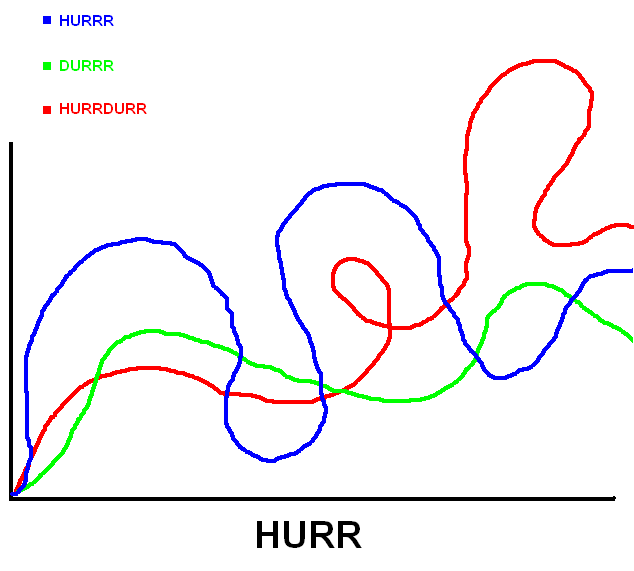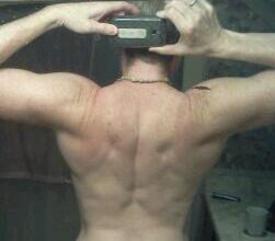Calorie deficit = no muscle mass gain. so why am I stronger?
Options
Replies
-
1.) Your muscles fill with water/glycogen as a result of strength training, making them look more "full". This is not true muscle tissue gain, even though the muscles do appear more prominent.Okay, my arms have always been very skinny- my husband calls them spaghetti arms.
There was barely any fat for muscles to hide under.
I eat at a deficit but see definite muscle definition in my arms and shoulders that I didn't have before.
So, how does that fit into your explanation?
2.) Even though you may not have had much fat covering the muscles, there was still fat there. As you lose it, muscle definition increases, revealing the fuller/more prominent muscles from 1) above.
How long do your muscles stay "full" after strength training?
Is this temporary only lasting a few hours etc. or permanent if you continue to lift on a regular basis?0 -
because just because your muscles repair and grow back stronger doesnt mean they grow bigger0
-
the obese beginner will see some initial muscle gains but this only lasts for about first two to three months of training...
You can get stronger while in a deficit, i.e. lift heavier stuff; it just means that your muscles are adapting to what you are lifting but you are not actually building additional muscle.
I have steadily increased my deadlift while eating in deficit; it does not mean that I have added muscle, just means I am stronger...big difference...
^^^ this. there are some special circumstances where you can gain a little muscle at a deficit, e.g. noob gains, muscle memory gains (e.g. where you regain muscle that you recently lost)
Also, gain in lean body mass does not mean growth of muscle tissue. Gain in lean body mass could be all kinds of things, including your muscles storing more glycogen which results in water weight gain, other water weight gains (e.g. from eating too much sodium), it could be a gain in bone density, there could be more food in your intestines, etc..... lean body mass is the weight of all of your body that isn't fat, and so a gain in lean body mass does not necessarily mean you've actually gained new muscle tissue.
As for strength - a lot of strength gains come from neuromuscular adaptation, i.e. your muscles get better at responding to the exercise and using more of the muscle fibres that you actually have, and using them more efficiently. You can see huge strength gains if you train right, without growing any new muscle tissue. After a certain level though, your body will need to build more muscle tissue to see further strength gains. but you'd be surprised how strong you can get with the muscles that you already have.0 -
few days.
1.) Your muscles fill with water/glycogen as a result of strength training, making them look more "full". This is not true muscle tissue gain, even though the muscles do appear more prominent.Okay, my arms have always been very skinny- my husband calls them spaghetti arms.
There was barely any fat for muscles to hide under.
I eat at a deficit but see definite muscle definition in my arms and shoulders that I didn't have before.
So, how does that fit into your explanation?
2.) Even though you may not have had much fat covering the muscles, there was still fat there. As you lose it, muscle definition increases, revealing the fuller/more prominent muscles from 1) above.
How long do your muscles stay "full" after strength training?
Is this temporary only lasting a few hours etc. or permanent if you continue to lift on a regular basis?0 -
I'm not saying it's not true but this whole thing has confused me as well. I DEFINITELY have put on muscle and I've been eating at a deficit for about a year now. I am FAR from obese and I'm not a beginner...Soooo...what gives? Has my body just adjusted to the deficit or what? lol Although, honestly, I don't care what I read on the internet anymore. I just look at my body and see if what I'm doing is working for me personally.
You're not gaining muscle, you're losing fat. Thus, your muscles are beginning to show more so you appear to have gained size.
Okay, my arms have always been very skinny- my husband calls them spaghetti arms.
There was barely any fat for muscles to hide under.
I eat at a deficit but see definite muscle definition in my arms and shoulders that I didn't have before.
So, how does that fit into your explanation?
1. noob gains (some muscle growth is possible in a deficit initally, but this stops after a short time)
2. increased blood flow within the muscles combined with increased storage of glycogen (and therefore water) within the muscle causes an increase in size that's often mistaken for muscle growth. this is known as "pump" in bodybuilding terms, and is frequently mistaken for muscle growth. Again, the muscle will not get bigger indefinitely from this, and in fact the pump goes away if you don't continue to work out regularly. This is the reason why a lot of women stop strength training, thinking that they put muscle on really, really easily and will turn into the incredible hulk if they continue. You can see a pump sometimes even after just a few workouts. I saw this in my shoulders and upper arms after just 1 week of stronglifts, but I knew it wasn't real muscle growth, just "pump"
3. after a pump and noob gains, you won't see your muscles get visibly bigger while eating at a deficit. Real growth of actual muscle tissue is really difficult to achieve, it requires a lot of training and eating at a surplus, and a lot of patience because it's slow for men to grow muscles, and even slower for women.
So there are lots of reasons why someone might think that they're growing muscle at a deficit beyond noob gains and muscle memory gains, but really it is extremely difficult to build new muscle tissue even eating at a surplus, especially if you're female. It's only when you have that as your primary goal that you realise just how difficult. You see a pump quickly, you see an increase in lean body mass from glycogen quickly, maybe you see some noob gains but all that stops and after that it's really, really difficult beyond those things, because after that the only thing that's going to make your muscles bigger is new muscle tissue.0 -
1. noob gains (some muscle growth is possible in a deficit initally, but this stops after a short time)
2. increased blood flow within the muscles combined with increased storage of glycogen (and therefore water) within the muscle causes an increase in size that's often mistaken for muscle growth. this is known as "pump" in bodybuilding terms, and is frequently mistaken for muscle growth. Again, the muscle will not get bigger indefinitely from this, and in fact the pump goes away if you don't continue to work out regularly. This is the reason why a lot of women stop strength training, thinking that they put muscle on really, really easily and will turn into the incredible hulk if they continue. You can see a pump sometimes even after just a few workouts. I saw this in my shoulders and upper arms after just 1 week of stronglifts, but I knew it wasn't real muscle growth, just "pump"
3. after a pump and noob gains, you won't see your muscles get visibly bigger while eating at a deficit. Real growth of actual muscle tissue is really difficult to achieve, it requires a lot of training and eating at a surplus, and a lot of patience because it's slow for men to grow muscles, and even slower for women.
QFT. As a chick who has intentionally bulked twice over the last 2 years... I can attest to this. Building muscle is HARD. I have spent many months eating at a surplus and training like a beast to gain just a little more mass. In fact, I suspect it's going to take me at least 2 more years (bulking 7+ months each) to get to where I want to be in terms of muscle mass. I was eating upwards of 3000 calories per day towards the end of my last bulk. If my surplus only yielded me small-to-moderate mass gains then I assure you... you can't be making much progress in a deficit!0 -
...and here are a couple great articles by Lyle McDonald addressing muscle mass gain (and why it isn't happening in a caloric deficit):QFT. As a chick who has intentionally bulked twice over the last 2 years... I can attest to this. Building muscle is HARD. I have spent many months eating at a surplus and training like a beast to gain just a little more mass. In fact, I suspect it's going to take me at least 2 more years (bulking 7+ months each) to get to where I want to be in terms of muscle mass. I was eating upwards of 3000 calories per day towards the end of my last bulk. If my surplus only yielded me small-to-moderate mass gains then I assure you... you can't be making much progress in a deficit!
http://www.bodyrecomposition.com/muscle-gain/general-philosophies-of-muscle-mass-gain.html
http://www.bodyrecomposition.com/muscle-gain/muscle-gain-mistakes.html0 -
...and here are a couple great articles by Lyle McDonald addressing muscle mass gain (and why it isn't happening in a caloric deficit):QFT. As a chick who has intentionally bulked twice over the last 2 years... I can attest to this. Building muscle is HARD. I have spent many months eating at a surplus and training like a beast to gain just a little more mass. In fact, I suspect it's going to take me at least 2 more years (bulking 7+ months each) to get to where I want to be in terms of muscle mass. I was eating upwards of 3000 calories per day towards the end of my last bulk. If my surplus only yielded me small-to-moderate mass gains then I assure you... you can't be making much progress in a deficit!
http://www.bodyrecomposition.com/muscle-gain/general-philosophies-of-muscle-mass-gain.html
http://www.bodyrecomposition.com/muscle-gain/muscle-gain-mistakes.html
^^Posted those same links on my blog like a year ago! 0
0 -
Thanks for all the replies. It makes sense to me now... Especially the reference to PhDs and learning ( I'm a teacher... I'm all over that). Just to clarify, I believe that you can't gain muscle in a deficit because I have read enough research articles to back it up. But all of your clarification about why I seem to be getting stronger has really helped me understand what's happening in my body.
Also... Thanks for not turning the thread into one huge dramatic cat fight.0 -
^^^ this. there are some special circumstances where you can gain a little muscle at a deficit, e.g. noob gains, muscle memory gains (e.g. where you regain muscle that you recently lost)
Also, gain in lean body mass does not mean growth of muscle tissue. Gain in lean body mass could be all kinds of things, including your muscles storing more glycogen which results in water weight gain, other water weight gains (e.g. from eating too much sodium), it could be a gain in bone density, there could be more food in your intestines, etc..... lean body mass is the weight of all of your body that isn't fat, and so a gain in lean body mass does not necessarily mean you've actually gained new muscle tissue.
As for strength - a lot of strength gains come from neuromuscular adaptation, i.e. your muscles get better at responding to the exercise and using more of the muscle fibres that you actually have, and using them more efficiently. You can see huge strength gains if you train right, without growing any new muscle tissue. After a certain level though, your body will need to build more muscle tissue to see further strength gains. but you'd be surprised how strong you can get with the muscles that you already have.
^^^ All of this.0 -
Slightly worrying info for a n00b, considering the problems I'm having getting out of my calorie deficit (and I'm a dude, so DOH yeah I want muscles) - BUT, still want to tag this post for future reference
 0
0 -
Strength gain =/= muscle gain ...from my understanding.0
-
The topic says it all. I have read on here for months that you cannot gain muscle in a calorie deficit. So here is my question. If I cannot gain muscle mass in a calorie deficit, how am I continually getting stronger? Can you gain strength without gaining muscle? I am able to lift more weights, do more pushes and am generally stronger but I have been in a calorie deficit for the past 6 months. Sorry if this question is completely ignorant but I just haven't seen an explanation for this on the site - just a constant influx of comments that you cant gain muscle in a calorie deficit. Thanks for any info!
Short answer: yes, you can.
Longer answer: neural adaptations allow for more muscle fiber recruitment and greater force of contraction in your muscles when you lift. Form improvements also aid in moving more weight.0 -
Any muscle when stressed will "blow up" from water and glycogen retention in the cells. This is usually why people will gain weight when they first start lifting. Now if you had hardly any fat on your arms, then this is a place where it stores it least. The places least to store are usually the first to lose fat, so as you lose you've lowered that body fat even more. If you've ever seen someone lose just 2% bodyfat, it can mean the difference between having visible abs and not.Okay, my arms have always been very skinny- my husband calls them spaghetti arms.
There was barely any fat for muscles to hide under.
I eat at a deficit but see definite muscle definition in my arms and shoulders that I didn't have before.
So, how does that fit into your explanation?
A.C.E. Certified Personal/Group FitnessTrainer
IDEA Fitness member
Kickboxing Certified Instructor
Been in fitness for 30 years and have studied kinesiology and nutrition0 -
Permanent if you continue. It's what gives the muscle that "hard" feel when you touch it.How long do your muscles stay "full" after strength training?
Is this temporary only lasting a few hours etc. or permanent if you continue to lift on a regular basis?
A.C.E. Certified Personal/Group FitnessTrainer
IDEA Fitness member
Kickboxing Certified Instructor
Been in fitness for 30 years and have studied kinesiology and nutrition0 -
Permanent if you continue. It's what gives the muscle that "hard" feel when you touch it.How long do your muscles stay "full" after strength training?
Is this temporary only lasting a few hours etc. or permanent if you continue to lift on a regular basis?
Ah, ninerbuff thank you for simple, straightforward, concise answers.0 -
All that muscle weighs more than fat nonsense you see, in reality both weigh about what water weighs. A pound of muscle is about the size of a pint. It doesn't take a whole lot to be a pretty obvious difference.
If that were true, then the water displacement method of measuring body fat percentage wouldn't work, because it is based on body fat having a lower mass per unit of volume than lean body mass does.
ahhhhhhh
::face desk::
a pound is a pound is a pound
weight, volume, and density are NOT synonyms... FFS
Human body fat has a lower specific gravity than muscle does, which means that it is less dense, which means that it weighs less per unit of volume, which means that pound of fat takes up more space than a pound of muscle.0 -
Bump lots of good info
 0
0 -
Muscle mass and strength are 2 different things. Strength is actually a mental perception.0
-
How is it a "mental perception" if, for example, you increase your bench press 1RM from 80 lbs. to 135 lbs.? That's not perception, that's an actual, measurable increase in strength.Muscle mass and strength are 2 different things. Strength is actually a mental perception.0 -
I am 1.5 weeks into a cutting phase (Granted I'm taking a fat burner and am supplementing with BCAAs for the first time ever). I am tracking everything.
Beginning - 178 lbs, 13.1% BF.
This morning - 177lbs, 12.4% BF.
These numbers are from calipers, read by the same person, at the same time of day.
Doing the math, that is 1.4 lbs of fat loss and .4 lb of lean mass gain. Even taking any kind of variance into account, there was some muscle gain.0 -
I am 1.5 weeks into a cutting phase (Granted I'm taking a fat burner and am supplementing with BCAAs for the first time ever). I am tracking everything.
Beginning - 178 lbs, 13.1% BF.
This morning - 177lbs, 12.4% BF.
These numbers are from calipers, read by the same person, at the same time of day.
Doing the math, that is 1.4 lbs of fat loss and .4 lb of lean mass gain. Even taking any kind of variance into account, there was some muscle gain.
I'm not convinced that you truly understand what a "variance" (or "margin of error") actually means.0 -
As a personal trainer, I'd think you would know that the inherent error/variance in skinfold caliper measurements is generally accepted to be in the 5% - 15% range. Accurately measuring a 0.7% change in BF% is a pretty dubious reach.I am 1.5 weeks into a cutting phase (Granted I'm taking a fat burner and am supplementing with BCAAs for the first time ever). I am tracking everything.
Beginning - 178 lbs, 13.1% BF.
This morning - 177lbs, 12.4% BF.
These numbers are from calipers, read by the same person, at the same time of day.
Doing the math, that is 1.4 lbs of fat loss and .4 lb of lean mass gain. Even taking any kind of variance into account, there was some muscle gain.0 -
My god why is this thread still going? The question was answered correctly in the first page.0
-
Because:My god why is this thread still going? 0
0 -
I don't know where you heard a skin caliper margin of error being 15%, but I think my point of the "variance" comment has been misinterpreted. The variance you're referring to applies to actual BF% vs. calculated BF%. The variance I'm referring to is exactly what I listed. Who takes the measurements each time, what time of day you measure, etc. Those variances, like water weight variances, are much smaller.
As a personal trainer, I'd think you would know that the inherent error/variance in skinfold caliper measurements is generally accepted to be in the 5% - 15% range. Accurately measuring a 0.7% change in BF% is a pretty dubious reach.I am 1.5 weeks into a cutting phase (Granted I'm taking a fat burner and am supplementing with BCAAs for the first time ever). I am tracking everything.
Beginning - 178 lbs, 13.1% BF.
This morning - 177lbs, 12.4% BF.
These numbers are from calipers, read by the same person, at the same time of day.
Doing the math, that is 1.4 lbs of fat loss and .4 lb of lean mass gain. Even taking any kind of variance into account, there was some muscle gain.0 -
Muscles are made of sub-units, each of which is either totally relaxed or totally contracting. If they all fired in random sequences, or all at the same time, etc, they wouldn't be nearly as efficient as they are when fired in the optimal sequence that best takes advantage of the leverage at that point in the move, versus the amount of force a muscle unit provides. When someone is new to lifting and tries to lift more than their max, all of their muscle fibers do in fact contract, it's just that the ordering of it is so sloppy that it accomplishes little to nothing.The topic says it all. I have read on here for months that you cannot gain muscle in a calorie deficit. So here is my question. If I cannot gain muscle mass in a calorie deficit, how am I continually getting stronger? Can you gain strength without gaining muscle? I am able to lift more weights, do more pushes and am generally stronger but I have been in a calorie deficit for the past 6 months. Sorry if this question is completely ignorant but I just haven't seen an explanation for this on the site - just a constant influx of comments that you cant gain muscle in a calorie deficit. Thanks for any info!
So as I understand it, the strength gains without mass gains are basically a matter of coordination, much like learning to do maneuvers on a video game controller, or how to do a flip, throw a fastball, or whatever. IOW strength gains would result from increased 'coordination' of the firing of muscles as the motor units in charge of firing them learn the optimal sequence/timing.0 -
IN for strength gains.0
-
Here, amongst others: http://weightology.net/weightologyweekly/?page_id=250I don't know where you heard a skin caliper margin of error being 15%, but I think my point of the "variance" comment has been misinterpreted. The variance you're referring to applies to actual BF% vs. calculated BF%. The variance I'm referring to is exactly what I listed. Who takes the measurements each time, what time of day you measure, etc. Those variances, like water weight variances, are much smaller.
His creds and curriculum vitae are under the "Meet the Editor" tab on his site.0 -
bump for later.0
This discussion has been closed.
Categories
- All Categories
- 1.4M Health, Wellness and Goals
- 396.9K Introduce Yourself
- 44.2K Getting Started
- 260.9K Health and Weight Loss
- 176.3K Food and Nutrition
- 47.6K Recipes
- 232.8K Fitness and Exercise
- 453 Sleep, Mindfulness and Overall Wellness
- 6.5K Goal: Maintaining Weight
- 8.7K Goal: Gaining Weight and Body Building
- 153.3K Motivation and Support
- 8.3K Challenges
- 1.3K Debate Club
- 96.5K Chit-Chat
- 2.6K Fun and Games
- 4.5K MyFitnessPal Information
- 16 News and Announcements
- 18 MyFitnessPal Academy
- 1.4K Feature Suggestions and Ideas
- 3.1K MyFitnessPal Tech Support Questions















